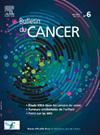[开发和验证用于系统识别癌症患者社会脆弱性的工具:DEFCO 工具]。
IF 1.1
4区 医学
Q4 ONCOLOGY
引用次数: 0
摘要
导言:文献表明,来自贫困背景的患者不太可能坚持治疗,继续暴露在风险因素中,因此健康状况较差。因此,及早发现这些弱势人群,为他们提供量身定制的强化护理至关重要。这项研究的主要目的是通过使用心理测量技术,构建并验证一种系统性筛查工具,用于识别因贫困而面临最高社会脆弱性风险的患者。该工具旨在方便医护人员使用,以便在患者的整个治疗过程中提供量身定制的、有针对性的护理:这项研究包括开发和评估一种筛查工具、一份自我问卷和一个包含人工神经网络的决策支持工具。这是一项前瞻性、单一中心、两阶段心理测量验证研究:结果:这项研究表明,采用心理测量方法成功开发了自我问卷。该工具在筛查社会脆弱性方面表现良好:讨论:这一经过验证的自我问卷是一种易于使用的工具,可以对癌症患者的社会脆弱性进行系统筛查。通过早期识别,可以加强患者的治疗路径,避免治疗中断。将这一工具整合到人工神经元网络系统中,可以实现自动化,并推广这种检测贫困患者的方法,同时减轻工作人员的工作量。本文章由计算机程序翻译,如有差异,请以英文原文为准。
Développement et validation d’un outil de dépistage systématique des fragilités sociales des patients atteints de cancer : l’outil DEFCO
Introduction
Les patients les plus démunis ont tendance à moins adhérer à leurs traitements, à continuer à s’exposer à des facteurs de risque et finalement à avoir un moins bon pronostic. Il est donc nécessaire d’identifier précocement ces populations afin de leur fournir des soins adaptés et renforcés. L’objectif principal de cette étude est de construire et valider, en utilisant une méthodologie psychométrique, un outil de dépistage systématique de la fragilité sociale permettant d’identifier les patients les plus à risque, facile à utiliser par tous les professionnels de santé, afin de leur fournir des soins spécifiques et adaptés tout au long de leur parcours de soins.
Méthode
Il s’agit d’une étude prospective, monocentrique, de validation psychométrique en deux étapes d’un outil de dépistage : le développement d’un auto-questionnaire et le développement et l’évaluation de la performance d’un outil d’aide à la décision utilisant un réseau de neurones artificiels.
Résultats
L’auto-questionnaire a été développé en suivant une méthodologie psychométrique. L’outil d’aide à la décision développé à partir de ce questionnaire a démontré une bonne performance dans le dépistage des fragilités sociales.
Discussion
Cet auto-questionnaire validé est un outil facile à utiliser, permettant un dépistage systématique des fragilités sociales chez les patients atteints de cancer. Cette identification précoce permet de renforcer l’accompagnement du patient afin d’éviter les ruptures de parcours. L’intégration de l’outil dans un système de réseau de neurones artificiels permet d’automatiser et de diffuser cette méthode de détection des patients vulnérables, tout en limitant la charge de travail du personnel.
Introduction
Literature suggests that patients from deprived backgrounds are less likely to adhere to their treatments, continue to expose themselves to risk factors and, as a result, have poorer health outcomes. It is therefore crucial to identify these vulnerable populations early on, in order to provide them with tailored and reinforced care. The primary aim of this research is to construct and validate a systematic screening tool for identifying patients at highest risk of social vulnerability due to deprivation, through the use of psychometric techniques. This tool is intended to be easily used by healthcare professionals, to provide tailored and targeted care throughout the patient's journey.
Method
This study involves the development and assessment of a screening tool, along with a self-questionnaire and a decision support tool incorporating an artificial neural network. It is a prospective, monocentric, 2-stage psychometric validation study.
Results
This study has demonstrated the successful development of the self-questionnaire using psychometric methodology. The tool was found a good performance in screening social vulnerabilities.
Discussion
This validated self-questionnaire is an easy-to-use tool, allowing systematic screening for social vulnerabilities for cancer patients. This early identification allows to reinforce patient's pathway in order to avoid disruption. The integration of the tool in an artificial neuron network system allows to automate and disseminate this method of deprived patients’ detection, while limiting the workload for the staff.
求助全文
通过发布文献求助,成功后即可免费获取论文全文。
去求助
来源期刊

Bulletin Du Cancer
医学-肿瘤学
CiteScore
1.90
自引率
16.70%
发文量
224
审稿时长
37 days
期刊介绍:
Without doubt, the ''Bulletin du Cancer'' is the French language publication of reference in the field of cancerology. Official organ of the French Society of Cancer, this journal covers all the information available, whether in the form of original articles or review articles, but also clinical cases and letters to the editor, including various disciplines as onco-hematology, solids tumors, medical oncology, pharmacology, epidemiology, biology as well as fundamental research in cancerology. The journal proposes a clinical and therapeutic approach of high scientific standard and regular updates in knowledge are thus made possible. Articles can be submitted in French or English.
 求助内容:
求助内容: 应助结果提醒方式:
应助结果提醒方式:


